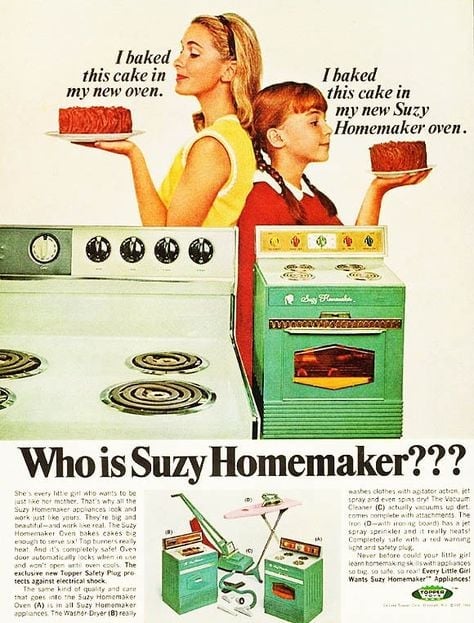International Women's Day was officially recognised in 1910 when Clara Zetkin, leader of the Women's Office for the Social Democratic Party in Germany, suggested, whilst at a conference made up of over 100 women across 17 countries, that women were celebrated on one day every year.
In aid of International Women's Day, this article takes you through the ages, showcasing some of the most memorable campaigns featuring women, spanning from the early 1960s to 2019.
1960 - Suzy Homemaker
Whilst the 1960s presented a new era of change, sexism was still a prevalent issue, particularly within advertising - think the era of Mad Men. 'Suzy Homemaker' was the name of a line of toys created by US brand Topper Toys. This range of toys essentially epitomised the sexist attitude towards family roles within society at the time, as Suzy Homemaker's sole purpose was to fulfil housekeeping duties. And this was showcased very apparently within their advertising, as they used tag lines such as; Who is Suzy Homemaker? - She's every little girl who wants to be just like her mother.

Over the years, as the Women's Rights Movement began to receive more coverage, Suzy Homemaker adverts were tweaked. For example, their later taglines would read 'Suzy Homemaker is a square', followed by the description 'She wears shoes. She even washes regularly. She gets more fun out being a cook than a kook.'
1984 - Apple
During the Superbowl in 1984, Apple aired what is considered one of the most memorable Super Bowl adverts of all time. The advertisement introduced Apple's Macintosh personal computer.
English athlete, Anya Mayor, performed as the unnamed heroine to represent the coming of the Machintosh (indicated by a drawing of the computer on her white t-shirt). During the advert, Anya tries to saves humanity from conformity by smashing 'Big Brother' with a sledgehammer. This was a notable reference to George Orwell's novel, Nineteen Eighter-Four, which described a dystopian future ruled by a televised 'Big Brother'.
Director Ridley Scott mentioned at the time that "the advert came as women's rights criticised the computer industry for ignoring women's roles in purchasing decisions." This adverts proved pivotal within the advertising industry and was the topic of discussion across various publications for years.
1994 - Wonderbra

'Hello Boys' was a billboard released by Wonderbra in 1994 and featured model and actress, Eva Herzigova. The advert promoted Wonderbra's push-up bra and featured Eva wearing the bra alongside the tagline 'Hello Boys,' in large lettering.
This was one of Wonderbra's most infamous adverts and gained great popularity at the time, with some even accusing it of causing traffic accidents because drivers 'would stop and stare' at the billboard.
However, in recent years, it has been accused of promoting sexism and many feminist groups have spoken against the iconic ad. As a result, in 2018 Wonderbra launched a comeback of the advert showing a woman in a similar pose to the original, wearing a strapless bra but with a pivotal change to the tagline so it read 'Hello Me'. The updated tagline was launched to position the brand as an ally to female empowerment.
2004 - Dove
In 2004, Dove decided to challenge the concepts of beauty by airing the 'Real Beauty' advert, which featured realistic representations of women. The campaign concept derived from a study conducted by Dove's PR firm at the time, Edelman, which found that only 2% of the 3,000 women interviewed considered themselves beautiful.

The aim of the campaign was to celebrate female figures in all forms and empower women to feel beautiful in all shapes, sizes and colours. The campaign was one of the first to expand television adverts and utilise digital, through the launch of online videos such as 'Evolution'. This video was an instant hit and gained millions of views over a short period of time.
The campaign went viral and not only had a huge impact on sales, increasing revenue from $2.5 billion to $4 billion in the campaign's first ten years, but was also proved to have a positive impact of women's confidence. Research from a Harvard psychologist, Nancy Etcoff, which examined women's perceptions of beauty before and after the launch of Dove's campaign, found that women later described beauty to include a variety of attributes as opposed to just looks.
Following the success of the initial campaign, Dove continues their movement through the 'Real Beauty Pledge', which has launched various initiatives, online sketches and projects to continue to empower women to be happy in their own skin.
2019 - Nike
At the beginning of 2019, Nike released the Dream Crazier campaign, which was narrated by tennis player Serena Williams. The advert listed stereotypes of women such as, 'if we show emotion, we're called dramatic' and 'if we want to play against men, we're nuts.'
The campaign was a follow-up to Nike's previous campaign 'Dream Crazy', and was aired during the 2019 Academy Awards. Nike's aim for the campaign was to 'shine a spotlight on female athletes who have broken barriers' and was a viral hit across all social media platforms following its launch.
Within one day of 'Dream Crazier' being aired, it had received over six million views on YouTube and more than 28 million on Twitter. In the following months, various celebrities advocated for the advert across social media, and Ellen Degeneres released a parody version which is now the seventh most-watched 'Dream Crazier' inspired clip on YouTube.
It is undeniable that the portrayal of women within advertising has shifted over the last few years. And with more and more people choosing mobile over desktop, and television moving towards online streaming, it goes without saying that the advertising industry as a whole is going through a period of change. With that in mind, over the coming years, we can definitely expect to see further changes to the way women are portrayed in advertising.
To find out about Croud and how we can support your online advertising initiatives, get in touch.


